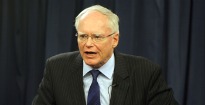Congress May Cut Funds for U.S. Mission in Iraq
 At the Atlantic, Elise Jordan writes about the prospect that Congress may cut funding for the U.S. diplomatic mission in Iraq:
At the Atlantic, Elise Jordan writes about the prospect that Congress may cut funding for the U.S. diplomatic mission in Iraq:
U.S. Ambassador to Iraq Jim Jeffrey took office this August in the midst of two political crises. In the U.S., Republicans were poised to sweep the impending elections and ultimately retake the House of Representatives over, among other things, public fury at the weak economy and government spending. Meanwhile, Iraq's elections, held in March, were still unresolved. Prime Minister Nouri al-Malaki refused to give up his post despite having lost narrowly to challenger Ayad Allawi, who himself was unable to gather a majority coalition in Parliament. In other words, Jeffrey was an Ambassador to a country without a government. Though that government is finally on the way to reforming, the challenges Jeffrey faces in Baghdad and back in Washington are not going to get much easier. As he fights a two-front diplomatic war, he may find Congress just as challenging in Iraq.
As the military draws down after the end of major combat operations, the White House hopes to have Jeffrey's embassy scale up. But after seven years of blank checks for Iraq, Congress is signaling that the U.S. mission there may actually be the target of spending cuts. The mood shift in Washington is a reflection of the new scrutiny on spending as well as the fact that, with the Iraq war declared officially over, it's much less of a political priority. As the U.S. mission in Iraq shifts from combat to diplomacy, there's much less interest in funding.
This has put President Obama in the odd position of asking Republicans not to cut funding for Iraq less than three years after Obama campaigned on ending the near-limitless Republican spending there. And it has left Jeffrey practicing his diplomacy not just in Iraq but in Washington as well, where he is emphasizing a selling point you don't often hear diplomats make: cost-effectiveness.
Obama is in the unique position of asking Republicans not to cut the Iraq effort. Just two and a half years ago, he was campaigning on cutting back the war and pushing back on Republican calls to continue funding. It's a reflection of the new scrutiny on spending as well as the fact that, now that the Iraq mission is officially "no longer a war," it's much less of a political priority. The phenomenon hasn't hit Afghanistan quite yet, maybe because it's still very much a war, but as the U.S. mission to Iraq shifts from combat to diplomacy, there's much less interest in funding it.
"We think that the steps taken, particularly on the 11th of November, have pushed [the Iraqi government] a considerable way," Jeffrey recently told me as we sat in the spacious Ambassador's residence within the vast Embassy compound in Baghdad. Maliki had secured a second term on November 11th, ending the eight months of political deadlock. "Now Prime Minister Maliki is on his thirty day deadline to form a government by the 25th of December." But the Iraqi Parliament remains unformed and the months of deadlock have only worsened the government ministries' notorious inefficiency, all of which makes it difficult for the Embassy to do basic work with is host country.
The plan, Jeffrey explained, is for the State Department take over from the Pentagon as the lead U.S. actor in Iraq, in part by opening two consulates in Basra and Erbil, two temporary embassy branch offices in Mosul and Kirkuk, and police training initiatives across the country. But that will require Baghdad's approval--and Congressional funding.
"All in all, if we can get permission from the Iraqi government, in terms of geographic separation, we will have four or five sites in Baghdad and then a number of sites around the country" managed by the State Department's Office of Security Cooperation, which handles military assistance. Jeffrey said. "It is a pretty significant transition." But it's also an expensive transition, one that Republican leadership may not be willing to fund.
Jeffrey's biggest challenge might not be in Iraq at all, but in Washington. Between the weak economy and the war in Afghanistan, Iraq has dropped on the list of national priorities. Incoming Republican leadership, eager to save money and skeptical of high-priced diplomacy, may balk at Jeffrey's price tag or even look for ways to trim the current Embassy budget. In a statement, incoming chairwomen to the House Foreign Affairs Committee Ileana Ros-Lehtinen announced she will propose a number of sweeping cuts to the State Department and foreign aid budget. In interviews, she has been more specific. "We have not taken it upon ourselves to really look at what has been going on in Afghanistan and Iraq, along with what have been the successes and the failures of our foreign aid budget,'' Ros-Lehtinen told McClatchy shortly after being appointed to the chair. State Department spokesman P.J. Crowley responded to Ros-Lehtinen's call by warning against reducing the civilian-led strategy in Iraq, calling it "critically important" to continue funding.
Click here to read the rest.

